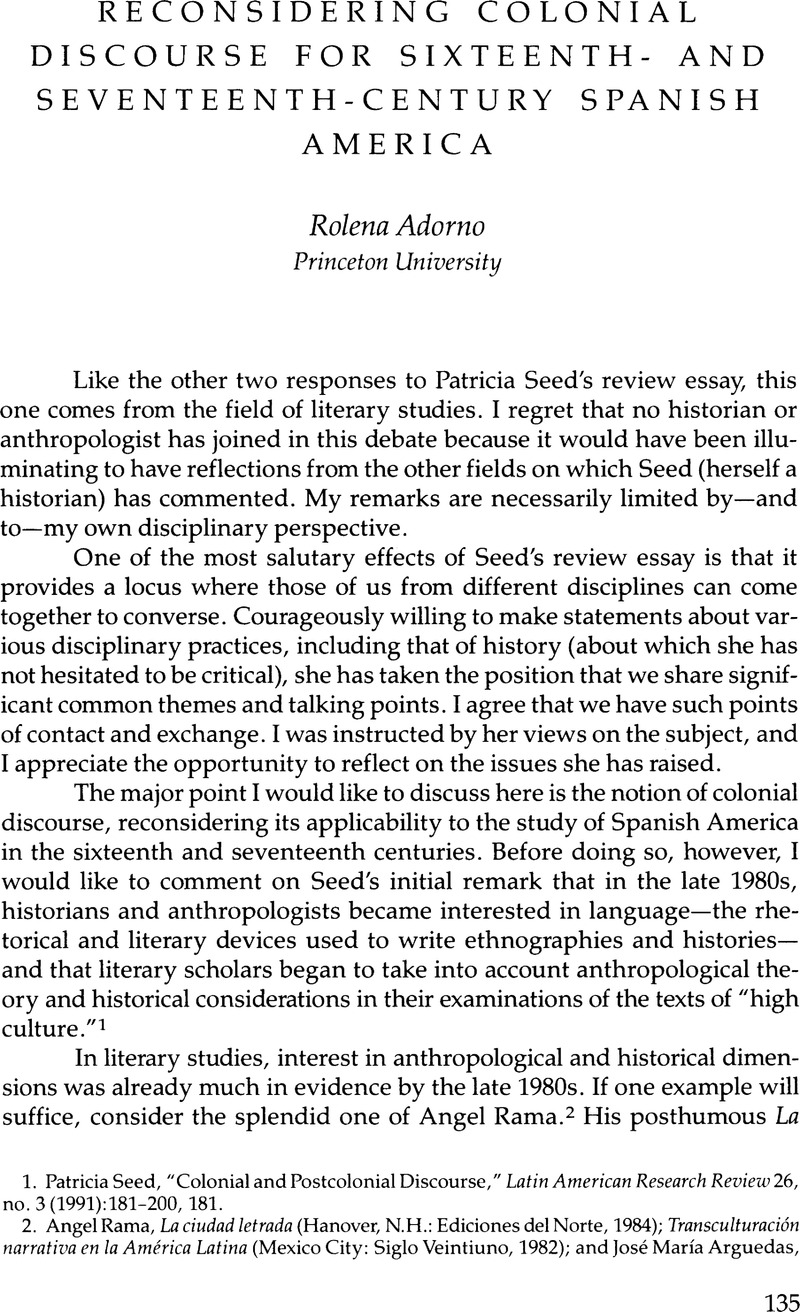Published online by Cambridge University Press: 12 October 2022

1. Patricia Seed, “Colonial and Postcolonial Discourse,” Latin American Research Review 26, no. 3(1991):181–200, 181.
2. Angel Rama, La ciudad letrada (Hanover, N.H.: Ediciones del Norte, 1984); Transculturación narrativa en la América Latina (Mexico City: Siglo Veintiuno, 1982); and José María Arguedas, Formación de una cultura nacional indoamericana, edited by Angel Rama (Mexico City: Siglo Veintiuno, 1975).
3. Roberto González Echevarría, Myth and Archive: A Theory of Latin American Narrative (Cambridge: Cambridge University Press, 1990).
4. Steve J. Stern, “Paradigms of Conquest: History, Historiography, Politics,” Journal of Latin American Studies 24, Quincentennial Supplement (1992):1–34, esp. 28–29.
5. Brooke Larson, Colonialism and Agrarian Transformation in Bolivia: Cochabamba, 1550–1900 (Princeton, N.J.: Princeton University Press, 1988); Karen Spalding, De indio a campesino: cambios en la estructura social del Perú colonial (Lima: Instituto de Estudios Peruanos, 1974); and Huarochirí, an Andean Society under Inca and Spanish Rule (Stanford, Calif.: Stanford University Press, 1984); and Steve J. Stern, Peru's Indian Peoples and the Challenge of Spanish Conquest (Madison: University of Wisconsin Press, 1982).
6. Peter Hulme, Colonial Encounters: Europe and the Native Caribbean, 1492–1797 (New York and London: Routledge, Chapman, and Hall, 1986).
7. This example comes from my analysis of the newly published record of land-title litigations in which Felipe Guarnan Poma de Ayala, the Peruvian author of the Nueva coránica y buen gobierno (1615), was a plaintiff. See Y no ay remedio …, edited by Elias and Alfredo Prado Tello (Lima: Centro de Investigación y Promoción Amazónica, 1991); and Rolena Adorno, “The Genesis of the Nueva coránica y buen gobierno,” Colonial Latin American Review (New York) 2, nos. 1–2 (1993):53–92.
8. Roland Barthes, Critical Essays, translated by Richard Howard (Evanston, Ill.: Northwestern University Press), 263. In my view, one of the most influential essays on the question of language as a signifying system not necessarily confined to the alphabetic was Barthes's Mythologies (1957). See Barthes, Mythologies, translated by Annette Lavers (New York: Hill and Wang, 1972).
9. Eric Van Young, “The Cuautla Lazarus: Double Subjectives in Reading Texts on Popular Collective Action,” Colonial Latin American Review (New York) 2, nos. 1–2 (1993):3–26.
10. I have used the concept in several of my publications, including “Discourses on Colonialism: Bernal Díaz, Las Casas, and the Twentieth-Century Reader,” Modern Language Notes, no. 103 (1988):239–58; and “Nuevas perspectivas en los estudios coloniales hispanoamericanos,” Revista de Crítica Literaria Latinoamericana, no. 28 (1988):11–27. In addition, Walter Mignolo and I edited a volume of Dispositio entitled “Colonial Discourse,” nos. 36–38 (1989).
11. Adorno, “Nuevas perspectivas,” 13–15.
12. Inscriptions, no. 1 (Dec. 1985):1.
13. J. Jorge Klor de Alva, “Colonialism and Postcolonialism as (Latin) American Mirages,” Colonial Latin American Review (New York) 1, nos. 1–2 (1992):3–23, citation from p. 16.
14. Ibid., 17.
15. Ibid.
16. Ibid., 18.
17. Ibid., 17.
18. One of the best examples from Spanish American intellectual and literary history of a transitional figure, who Janus-like looks both backward and forward, is the Mexican creole writer Carlos Sigüenza y Góngora (1645–1700), a distant relative of the Spanish Baroque poet Luis de Góngora. An obvious example of a creole intellectual who can be identified with the world of colonial discourse would be the Mexican friar and patriot Fray Servando Teresa de Mier (1763–1827).
19. Beatriz Pastor, Discursos narrativos de la conquista: mitificación y emergencia, 2d ed. (Hanover, N.H.: Ediciones del Norte, 1988).
20. Tzvetan Todorov, The Conquest of America, translated by Richard Howard (New York: Harper and Row, 1984); and Stephen Greenblatt, Marvelous Possessions: The Wonder of the New World (Chicago, Ill.: University of Chicago Press, 1991).